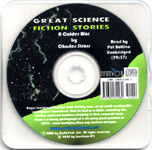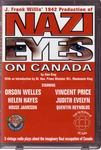
 Airborn
Airborn
By Kenneth Oppel; Performed by a FULL CAST
10 CDs – 10.5 Hours [UNABRIDGED]
Publisher: Full Cast Audio
Published: 2006
ISBN: 1933322543
Themes: / Fantasy / Parallel World / Alternate History / Airships / Swashbuckling / Pirates /
…the pirate airship was already adjusting its course, keeping pace, and as it forced us closer to the waves, we would have less space to manoeuvre. There was a great flash from the pirate ship’s underbelly and a thunderous volley of cannon fire scorched the night sky across our bow.
A voice carried by bullhorn shuddered the air. “Put your nose to the wind and cut speed.”
The story of Airborn is told by 15 year old Matt Cruse, a lowly cabin boy on the a ziz-like commercial airship called the Aurora, primarily used as a passenger liner, the Aurora also carries industrial an commercial goods between continents. Matt was actually born in the air and dreams of becoming an officer one day, not only to further his career as an airman but also to better support his family back home. One day, while aloft and on watch, Matt spies a damaged hot air balloon drifting in the South Pacificus. Only Matt’s natural aptitude in the rigging can save the dying man carried in it. When Matt rescues him the feverish old man’s words are of an amazing, and highly improbable creature he’d spotted in the sky. A year or so later, young Kate de Vries, who was granddaughter to the hot-air balloonist, comes aboard the Aurora. Kate herself has dreams of following in her grandfather’s flightpath and becoming a famous naturalist. They might never have discovered her grandfather’s secret though, had it not been for sudden and vicious pirate raid lead by the legendary air-pirate Szpirglas (pronounced Spear-glass). After the attack and crash-landed on an uncharted island off the regular air-routes it is up to Matt to discover the secret of Kate’s grandfather, repair the damaged airship along with the crew and win the heart of Kate herself. If Matt can just pull it all together he might even live long enough to attend the Air Academy and become a officer.
This is a simple, almost classically structured, juvenile adventure story in the Heinleinian tradition. What is so different about this novel is that it isn’t set in a familiar setting – no spaceships and farm boys here, instead we have an alternate history/alternate universe tale, set on Earth, but an Earth which has place names subtly altered (The city of Vancouver is called Lionsgate City, the Pacific ocean is the Pacificus). Most importantly a flourishing airship economy has made the world of Airborn a cross between a benign steampunk world and pneumatic tube etherland of alternate science and technology. The successful airships industry is buoyed not by helium or hydrogen but instead by a mango scented and plentiful noncombustible gas: hydrium. Also in use are ornithopters, which are a fun but failed technology in our world, though they seem to serve well enough in Airborn, at least for short hops. The world’s extant empires are all subtly altered too, it appears that the expansive British Empire centered in “Angleterre, is tempered, perhaps by a more vigorous Germanic or French empire? North America itself is cut-up into “Kanada” and the “American Colonies”. The Aurora itself though is the primary setting of the novel. As a commercial passenger airship it is based out of Lionsgate City (Vancouver) and plies the airways of the Pacific to Sydney, Siberia and beyond.
There is a tremendous difference between a FULL CAST reading and a regular audiobook. A full cast audiobook, and by that I mean a FULL CAST AUDIO production, is as close to an audio drama as you can get without actually becoming a dramatization. Each character has his or her own actor, this along with descriptive text and punctuating music transmogrifies the unabridged words into vibrant mental images. I’d be willing to bet that if you were to hook-up a person listening to Airborn to a Functional Magnetic Resonating Imaging machine the FMRI would show tremendous activity in the visual cortex. There is a sequel, called Skybreaker in the release pipeline coming from Full Cast Audio, if it lives up to the standard set in writing and production it will be an SFFaudio Essential too.





